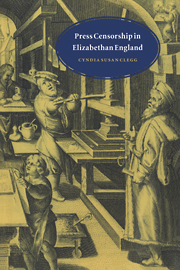Book contents
- Frontmatter
- Contents
- Preface
- PART I THE PRACTICE OF CENSORSHIP
- PART II CENSORED TEXTS
- 4 Catholic propagandists: “concerning the Queen's majesty or the realm without licence”
- 5 George Gascoigne and the rhetoric of censorship: A Hundreth Sundrie Flowres (1573) and The Posies (1575)
- 6 John Stubbs's The Discovery of a Gaping Gulf and realpolitik: “The kings sin striketh the land” but “God Save the Queen”
- 7 The review and reform of Holinshed's Chronicles: “reporte of matters of later yeers that concern the State”
- 8 Martin Marprelate and the puritan press: “as thou hast two eares, so use them both”
- 9 The 1599 bishops' ban: “shreud suspect of ill pretences”
- 10 Conclusion: “That libertie Poets of late … have exceeded”
- Notes
- Index
4 - Catholic propagandists: “concerning the Queen's majesty or the realm without licence”
Published online by Cambridge University Press: 23 December 2009
- Frontmatter
- Contents
- Preface
- PART I THE PRACTICE OF CENSORSHIP
- PART II CENSORED TEXTS
- 4 Catholic propagandists: “concerning the Queen's majesty or the realm without licence”
- 5 George Gascoigne and the rhetoric of censorship: A Hundreth Sundrie Flowres (1573) and The Posies (1575)
- 6 John Stubbs's The Discovery of a Gaping Gulf and realpolitik: “The kings sin striketh the land” but “God Save the Queen”
- 7 The review and reform of Holinshed's Chronicles: “reporte of matters of later yeers that concern the State”
- 8 Martin Marprelate and the puritan press: “as thou hast two eares, so use them both”
- 9 The 1599 bishops' ban: “shreud suspect of ill pretences”
- 10 Conclusion: “That libertie Poets of late … have exceeded”
- Notes
- Index
Summary
Mandating both print licensing and the High Commission within the 1559 religious settlement displayed the government's early concern over printed opposition to Elizabethan religion – a not unusual concern given the precedents. The statutory settlement, however, did not designate Catholicism as heretical, and the Queen's Injunctions deplored employing heretic, papist, etc. as terms of derogation. Bishop Jewel's challenge, with its clear expectation of Catholic response, suggests that government anxieties were associated with something other than discussions of dogma. Being Catholic or writing about Catholic belief- at least in the early years of Elizabeth's reign – was neither transgressive nor inherently seditious. After the Northern Rebellion and the 1570 Papal Bull excommunicating Elizabeth, Roman Catholic religion and politics became inseparable. The deaths of 160 Catholic priests and 60 Catholic laymen in England between 1558 and 1603, most after 1580, bear testimony to the government's active prosecution of perceived Catholic sedition. While the justifiability of these prosecutions has been widely debated, history has maintained a consensus about government censorship of Catholic books: Catholic texts were illegal, and Elizabeth's government relentlessly sought out Catholic presses and suppressed Catholic texts. Commands existed to burn popish books and paraphenalia. Searches, midnight raids, patrols of English ports, spies and counterspies at home and abroad sought to “stifle the thought and faith of man.” After the 1571 parliamentary act against reconciliation prohibited importing Catholic religious objects (upon a sentence of forfeiture of property), the authorities engaged in widespread searches to discover evidence – including “popishe bookes” – of Catholic missionary activities.
- Type
- Chapter
- Information
- Press Censorship in Elizabethan England , pp. 79 - 102Publisher: Cambridge University PressPrint publication year: 1997

